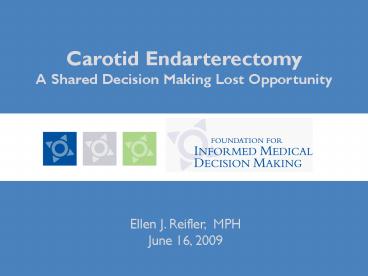Carotid Endarterectomy A Shared Decision Making Lost Opportunity - PowerPoint PPT Presentation
1 / 15
Title:
Carotid Endarterectomy A Shared Decision Making Lost Opportunity
Description:
... is necessary that they are a 'ticking time bomb' ... Death is scary this disease sounds like it will kill you and kill you fast ('ticking time bomb. ... – PowerPoint PPT presentation
Number of Views:389
Avg rating:3.0/5.0
Title: Carotid Endarterectomy A Shared Decision Making Lost Opportunity
1
Carotid Endarterectomy A Shared Decision Making
Lost Opportunity
- Ellen J. Reifler, MPH
- June 16, 2009
2
Acknowledgements
- Pamela H. Wescott, MPP, FIMDM, Boston
- Charity Curtis, FIMDM, Boston
- Colin Nelson, FIMDM, Boston
- Ethan A. Halm, MD, MPH, Mount Sinai Hospital, NY
3
When is CEA a Preference Sensitive Decision?
- Population is patients who are asymptomatic
- Diagnosed with Carotid Artery Stenosis
- Have not had a stroke or TIA (Transient Ischemic
Attack) caused by carotid artery disease in the
past 12 months
4
Evidence
- There is about a 2 risk of stroke per year for
people who are asymptomatic - With CEA, there is 1 per year decrease in
incidence of stroke, if you live for five years
(6 ) in a setting where complication rate is 3
or less
5
Evidence
- No evidence that CEA increases life span
- No evidence that CEA improves the quality of life
(doesnt reduce fatigue, doesnt reduce
dizziness, doesnt give you more energy)
6
CEA Trade Offs
- There is a 3 chance that you will have a stroke
within 30 days caused by surgery - Theres a risk reduction of 6 if you live for
five years (From about 12 to 6) - Do you risk a stroke to prevent a stroke?
7
Who We Found
8
Demographics 11 Participants
9
What Were They Thinking?
- If I dont have this surgery, I could have a
stroke and die Its more serious if you have no
symptoms because all of a sudden you drop dead,
thats how it was explained to me (80 year old
man) - Theres a 98 percent chance I will have a
stroke if I dont have the CEA (77 year old
woman)
10
- I needed to have something done but there was no
discussion, no if, ands or buts. (90 year old
man) Someone in the focus group responds, Do
you want to live or do you want to die? and
everyone agrees. - The risk of surgery was real, but relatively
small, certainly small in comparison to not doing
anything(63 year old man)
11
- If you get threatened with a stroke, do
everything you can to avoid it (56 year old man
who had stroke) - I didnt think about the risk of surgery because
Doctor X inspires confidence (88 year old
woman) She was told by her doctor I have never
operated on anyone your age but if I dont you
could have a stroke in two years
12
What Did We Learn?
- People with asymptomatic carotid stenosis usually
do not realize that they have a treatment
decision - Some mistakenly believe that an imaging finding
of carotid stenosis means that a disabling or
life threatening stroke is imminent, that
immediate intervention is necessarythat they are
a ticking time bomb - Many think all strokes are disabling
13
What Did We Learn?
- Many overestimate their risk of stroke without
surgery and underestimate the risks of an
operation - Some overestimate the benefits of surgery and
mistakenly believe it will help them feel better
(e.g. improve memory, vitality, fitness, and
pain) and help them live longer. - Most patients expect their doctor to tell them
what to do
14
Discussion
- Why are highly educated people, with excellent
access to care and supportive family unaware that
CEA is a decision? - Death is scarythis disease sounds like it will
kill you and kill you fast (ticking time bomb.) - Strokes are scary---If it doesnt kill you, you
risk a disabling stroke which (like cancer) is a
condition that is feared more than heart disease
15
Barriers to SDM
- SDM can not happen unless patients understand the
basics of their condition - SDM can not happen unless patients are presented
with the risks and benefits of treatment - SDM is harder when the stakes are high. It is
easier to accept participating in decisions with
your doctor when you dont feel time is of the
essence and your life is at stake































